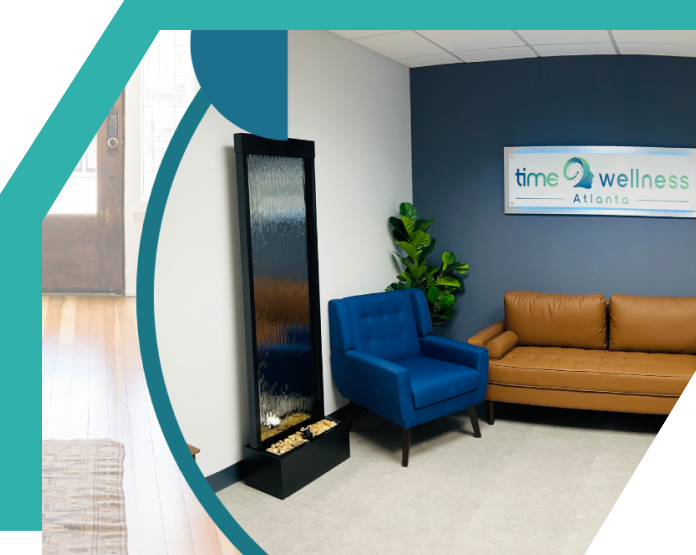Trauma and PTSD Treatment In Chattanooga, TN
Learn more about Time Wellness Center’s Trauma & PTSD treatment in Chattanooga, TN, and find out how we can help you find relief.
- Home
- Trauma and PTSD

Trauma and PTSD In Tennessee
Trauma therapy in Chattanooga, TN, allows the management of post-traumatic stress disorder and the adverse effects inflicted on individuals with the diagnosis. In addition, traumatic events produce recurring images, feelings, and thoughts in the minds of those who experience them and trigger unpleasant symptoms. The symptoms of PTSD can have challenging and adverse effects on every aspect of life. Fortunately, researchers have found effective and evidence-based therapies to manage this mental condition.
Traumatic events elicit intense feelings of fear to initiate the fight-or-flight response in the body. For example, a fight-or-flight response is a defensive reaction that assists in avoiding or responding to danger or trauma. Anyone who experiences trauma may continue to have high stress and a fearful disposition throughout everyday life. Ultimately, triggers that are reminders of aspects of the trauma produce the intense symptoms of PTSD that require management through trauma therapy in Chattanooga, TN.
What Is PTSD?
Those who experience one or more traumas may develop post-traumatic stress disorder, categorized as an anxiety disorder. Components of the trauma trigger the same fearful reaction or fight-or-flight response present at the time of the original traumatic event. Not everyone who experiences trauma develops PTSD, but combat veterans have a high percentage of cases. Studies conclude six out of every one hundred people exposed to trauma develop this disorder.
Trauma therapy in Chattanooga, TN, can reveal individual risk factors for developing post-traumatic stress disorder. Fortunately, understanding the significant factors contributing to the condition’s development can help manage long-term symptoms. There are three types of PTSD acute, chronic, or complex, diagnosed when symptoms present. Interestingly, those who witness someone else’s trauma can also be affected, just as those who are in the traumatic event.
The following risk factors increase the probability of developing PTSD:
- Previous exposure to traumatic experiences, especially during childhood
- Experiencing being injured or witnessing other people being hurt or dying
- Feeling intense horror and extreme fear while completely helpless
- Experiencing a trauma with no support system in place
- Loss of a loved one, job, or home and extended periods of stress
- A family history of mental disorders or substance use disorders
- Experience of physical, sexual, or mental abuse
- Childhood neglect
- Military events or gun violence
- Natural disasters such as floods, tornadoes, or hurricanes
- Long-term severe illness
- Extreme motor vehicle accidents
Signs And Symptoms of PTSD
Risk factors and exposure to trauma(s) are significant factors in diagnosing PTSD. For example, trauma therapy in Chattanooga, TN, can explain how avoidance, arousal, reactivity, and re-experiencing factors connected to the trauma can be significant in a diagnosis. Those with PTSD find it challenging to control the following cognitions and behaviors. Before an individual can receive the diagnosis of post-traumatic stress disorder, the following requirements must be present for at least one month:
- A minimum of one re-experiencing symptom
- A minimum of one avoidance symptom
- The minimum of two arousal and reactivity symptoms
- The minimum of two cognition and mood symptoms
Re-experiencing symptoms can include any of the following signs and symptoms:
- Dealing with flashbacks that relive the trauma and include the experience of physical symptoms of extreme fear
- Recurring memories, dreams, and thoughts with a connection to the trauma
- Uncontrollable upsetting or distressing thoughts
- Continual physical symptoms of stress
Reminders of a traumatic event, such as words, objects, or situations triggering uncomfortable thoughts and feelings, can initiate avoidance behaviors. This is an example of how PTSD can significantly affect daily life. Intense fearful thoughts force patients to change their routines to avoid any reminders of the trauma. Finally, avoidance behaviors can escalate symptoms of depression, anxiety, or other mental conditions.
Avoidance symptoms can include:
- Staying away from places, events, or objects that are reminders of the traumatic experience
- Avoiding thoughts or feelings related to the traumatic event
Continued heightened anxiety can make individuals feel overly sensitive and responsive to their environment. Hyperarousal describes this intensely sensitive state. The feelings of hyperarousal are continual and often escalate to extreme stress and anger. Again, these signs and symptoms of PTSD interfere with fundamental factors of daily life, such as sleeping, eating, and concentration.

Arousal and reactivity symptoms can include any of the following behaviors associated with PTSD:
- Constant difficulties with focus and concentration
- Feeling extreme tension, guarded or on edge causing a strong startle effect
- Sleep disturbances
- Feelings of irritability, anger, and aggression
- Behavior that is risky, reckless or destructive
Feelings of detachment can worsen after a trauma, leading to isolation and withdrawal. Thoughts and moods can be volatile and uncontrollable, leading to desperation, depression, and anxiety. Trauma therapy in Chattanooga, TN, can help to identify and recognize individual signs and symptoms. Cognition and mood symptoms can include any of the following:
- Difficulty recalling significant elements of the trauma
- Obsessive negativity towards oneself or the world
- Irrational exaggerations including blaming oneself or others
- Continual feelings of fear, anger, guilt, or shame
- An inability to feel joy or happiness in life
- Social isolation and withdrawal
Treatment for PTSD
Trauma therapy in Chattanooga, TN, offers encouragement in managing the symptoms of PTSD. An experienced mental health professional can assess to make the correct diagnosis and design a treatment plan. A combination of psychotherapy and medications is a practical choice. Recognizing and diagnosing co-occurring mental disorders is necessary for a successful recovery and must be added to the treatment plan.
Evidence-based therapies utilize specific techniques to learn how to identify triggers and manage challenging emotions, thoughts, and behaviors. Comprehensive treatment plans include psychotherapy to include the patient and their support system. Depending upon the severity of the disorder, treatment times will vary. The following therapies are typically effective for treating PTSD.
- Cognitive-behavioral therapy (CBT)
- Exposure therapy
- Dialectical Behavioral Therapy (DBT)
- Acceptance and Commitment Therapy (ACT)
- Cognitive restructuring
Medications in combination with psychotherapy can be effective for the initial management of intense symptoms. The United States Food and Drug Administration has approved two selective serotonin reuptake inhibitors (SSRIs) to treat PTSD. The medication decision comes from a healthcare provider working directly with a mental health professional.

The Benefits of PTSD Inpatient Treatment
Trauma therapy in Chattanooga, TN, is a vital decision for those struggling with the overwhelming symptoms of PTSD. Taking two steps forward in recovery and five steps backward when triggers occur can feel self-defeating and negatively impact life. Inpatient treatment for PTSD reframes the trauma, builds a strong foundation for recovery, and allows healing to begin. While personally healing, patients can also work to rebuild relationships and other aspects of their life negatively affected by trauma.
Around-the-clock care is available to address vulnerabilities with the team, leading to a more supportive environment. Partial hospitalization programs (PHP) can be a successful option for patients needing less care. Aftercare and additional unique treatment options can address individual concerns and needs. Trauma therapy in Chattanooga, TN, offers many options and combinations of therapy options for a successful recovery from PTSD and trauma.
Levels of Care at Time Wellness
Residential Program
Our inpatient program in Tennessee begins with meeting the care team and reviewing your program. Enjoy each day of a journey to realize how a healthy body and mind can be the foundation for a successful future. This program is our recommendation for those with severe symptoms or suicidal behaviors.
Partial Hospitalization
A step-down level of care could be an option after completing specific goals in the residential program. In some cases, it could be a step up. This structured program in Chattanooga provides care in the mental health center three to five days a week for several hours a day.
Intensive Outpatient
An alternative treatment method can be a successful therapy option for many people. This treatment is more extended, but IOP requires three days a week and three hours daily. Intensive outpatient programs allow people to live at home, continue to work, or care for their families during treatment.
Outpatient Program
A solid program that includes several options for evidence-based therapies in a clinical setting. Outpatient care in Chattanooga is a flexible treatment program that allows you to stay home or in a sober living program during treatment.
Supportive Housing
A supportive living environment shared with a community of residents with similar goals live together in group housing. Offering immediate access to clinical and peer support, this type of group housing can be an invaluable asset in the treatment plan.
PTSD Inpatient Trauma Treatment In Chattanooga, TN
Our caring and compassionate team is here to help.
PTSD can be challenging to manage, and the symptoms can feel overwhelming. If you seek help to regain control of your life, process trauma, and manage PTSD in Tennessee, Time Wellness can be what you desire. Providing evidence-based therapies, and holistic options, our mental health professionals assess co-occurring disorders that are present and include them in your treatment plan. Contact our admissions personnel to move forward today toward healing!
Give Us A Call. We’re here To Help.
Or

Request a call
Contact
Copyright © 2024 Time Wellness Tennessee - All Rights Reserved.
Embrace self-care. Seek assistance for your mental health.








